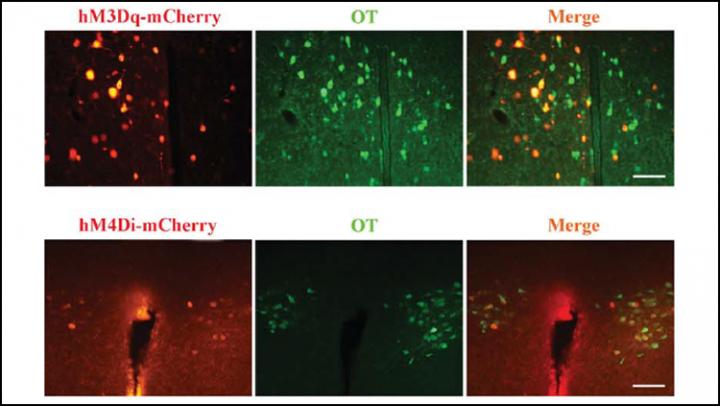Connection between hypothalamus and reward areas crucial for fatherly behavior

Credit: He et al., JNeurosci 2021
Like female voles, connections between oxytocin neurons in the hypothalamus and dopamine neurons in reward areas drive parental behaviors in male voles, according to new research published in JNeurosci.
Motherhood receives most of the attention in the research world, yet in 5% of mammals — including humans — fathers provide care, too. The “love hormone” oxytocin plays a role in paternal care, but the exact neural pathways underlying the behavior were not known.
He et al. measured the neural activity of vole fathers while they interacted with their offspring. Oxytocin neurons connecting the hypothalamus to a reward area fired when the fathers cared for their offspring. Stimulating the oxytocin neurons increased paternal behaviors, while inhibiting them reduced paternal behaviors. Inhibiting the pathway led to decreased dopamine release in the reward area when the fathers cared for their pups. These pathways are the same ones involved in promoting maternal behavior in female animals. Understanding the pathways driving paternal care could lead to interventions for paternal postpartum depression or paternal abuse.
###
Paper title: Paraventricular Nucleus Oxytocin Sub-Systems Promote Active Paternal Behaviors in Mandarin Voles
About JNeurosci
JNeurosci, the Society for Neuroscience’s first journal, was launched in 1981 as a means to communicate the findings of the highest quality neuroscience research to the growing field. Today, the journal remains committed to publishing cutting-edge neuroscience that will have an immediate and lasting scientific impact, while responding to authors’ changing publishing needs, representing breadth of the field and diversity in authorship.
About The Society for Neuroscience
The Society for Neuroscience is the world’s largest organization of scientists and physicians devoted to understanding the brain and nervous system. The nonprofit organization, founded in 1969, now has nearly 37,000 members in more than 90 countries and over 130 chapters worldwide.
Media Contact
Calli McMurray
[email protected]
Related Journal Article
http://dx.




